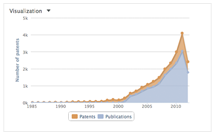404: Page Not Found
Ugh :\
We couldn't find that page!
It might be an old link or maybe it moved.
Here are some other things you can do on Patexia:

Research
Use powerful research tools, search millions of patents, analyze trends
Start Your Research »

Network
Showcase your scientific work, follow your interests, voice your opinions
Go to Your Profile »